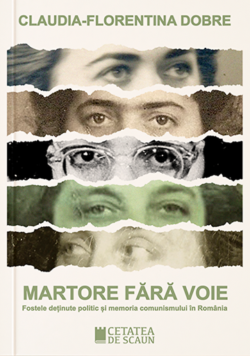
Seminar: Unwilling Witnesses. Women, Former Political Detainees, and the Memory of Communism in Romania. Claudia-Florentina Dobre in conversation with Ionuț Biliuță
At the monthly PoSoCoMeS seminar, Ionuț Biliuță discusses aspects of the memory of post-communist resistance with Claudia-Florentina Dobre within the context of the book under discussion: “Unwilling Witnesses. Women, Former Political Detainees, and the Memory of Communism in Romania”. The book tells the story of seven women, former political detainees during communism in Romania.The stories of these women are told from the perspective of the present, dominated by the anti-communist paradigm, and through the lens of unwilling witnesses of difficult historical times. The book analyses the post-communist social frameworks of memory in order to understand what was at stake in promoting the memory of communism in Romania both from a witness and societal perspective.
Claudia-Florentina Dobre is the Director of the Center for Memory and Identity Studies (CSMI) and of MemoScapes. Romanian Journal of Memory and Identity Studies, and a researcher at “Nicolae Iorga” Institute of History, Bucharest. She got her Ph.D. in History from Laval University of Québec in 2007, with a thesis on women’s memory of communist political persecutions in post-communist Romania. She conducted research on the memory of communism, on museums, memorials, and monuments, deportation, and everyday life in Romania during communism, on knowledge exchange and academic cultures in the Black Sea Region in the XXth century. Her most recent publications are “Martore fără voie. Fostele deținute politic și memoria comunismului în România” (Unwilling Witnesses. Women,former political detainees and the memory of communism in Romania), Târgoviște, Cetatea de Scaun, 2021; Claudia-Florentina Dobre, Bernadette Jonda, Izabela Skorzynska, Anna Wachowiak, “Eroine neștiute. Viața cotidiană a femeilor în perioada comunistă în Polonia, România și RDG” (Unknown heroines. Women everyday life during communism in Poland, Romania, and GDR), edited by Claudia-Florentina Dobre, Târgoviște, Cetatea de Scaun, 2020; “Ni victime, ni héroïne: les anciennes détenues politiques et les mémoires du communisme en Roumanie”, Electra, Bucharest, 2019; Claudia-Florentina Dobre, Bernadette Jonda, Izabela Skorzynska, Anna Wachowiak, “(Re)gaining the Future by (Re)building the Past. Women`s Narratives of Life under Communism in Poland, Romania and the Former East Germany”, edited by Izabela Skorzynska, Poznan University Press, 2019; Claudia-Florentina Dobre, Cristian Emilian Ghita, (ed.), “Quest for a Suitable Past: Myth and Memory in Eastern and Central Europe”, Budapest-New York, CEU Press, 2017.
Ionuț Biliuță works as a researcher with “Gh. Sincai Institute” (Tg. Mureș, Romania)/Romanian Academy and as a Research Fellow at the Polish Institute of Advanced Studies (Warsaw, Poland). His latest publication is “Constructing Fascist Hagiographies: The Genealogy of the Prison Saints Movement in Contemporary Romania,” Contemporary European History (2021): 1–21. https://doi.org/10.1017/S0960777321000424